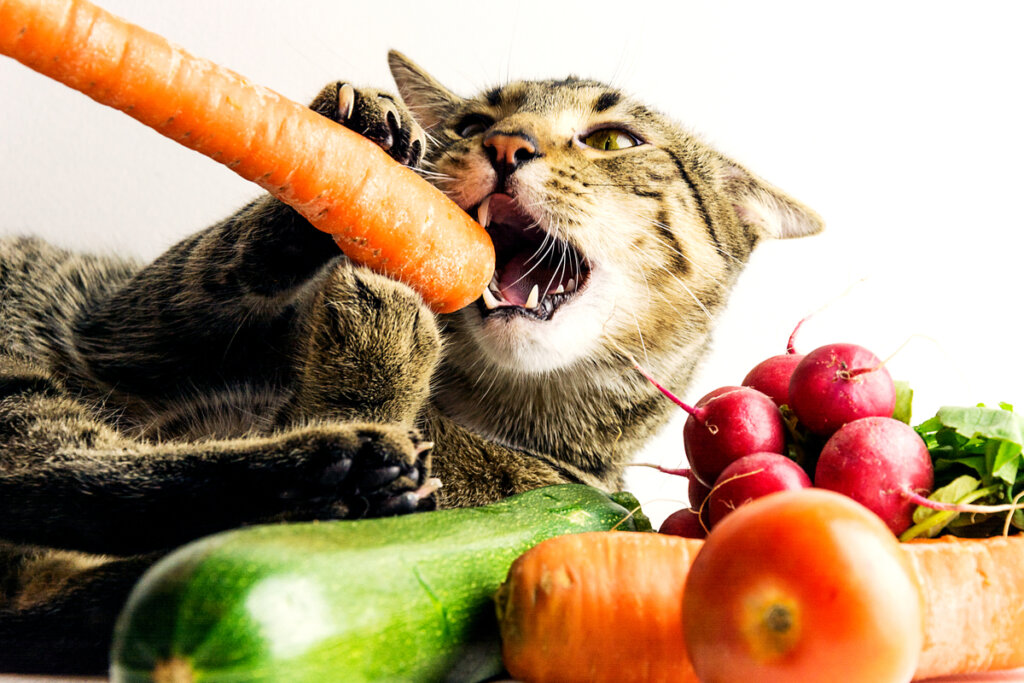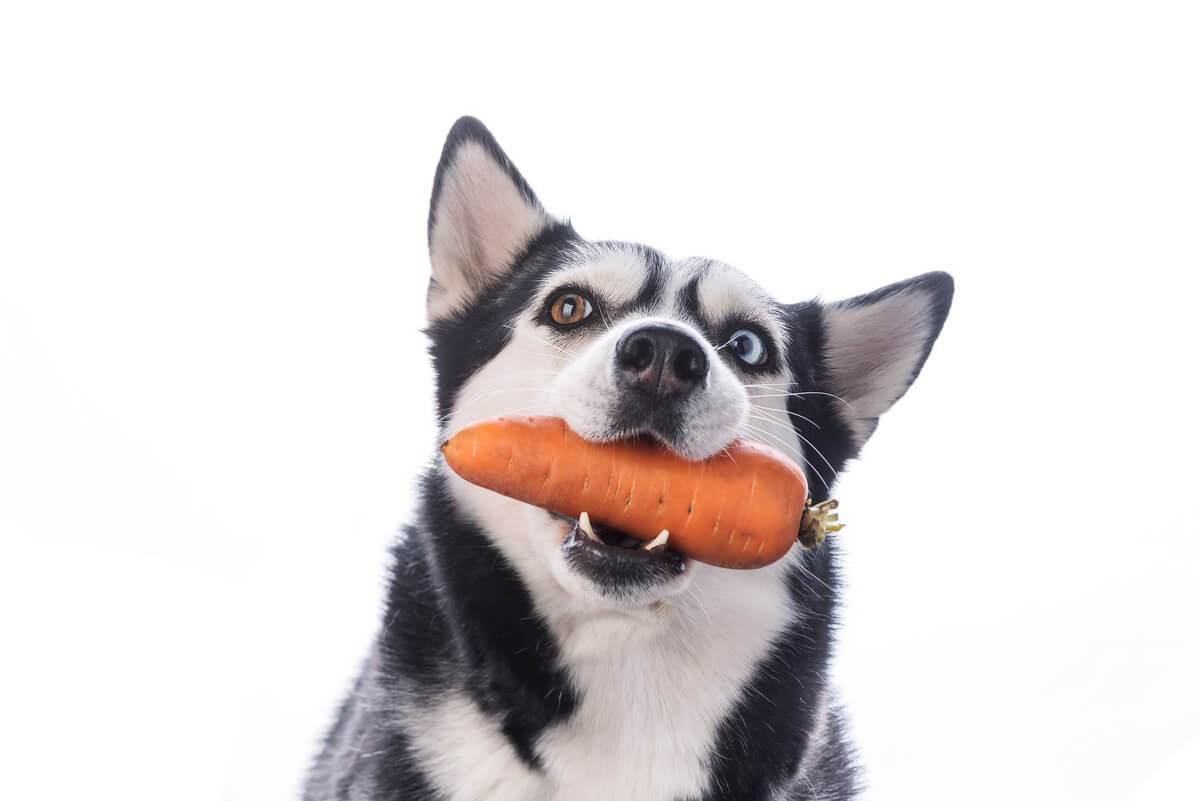Vegan Diets for Pets are Incomplete, Experts Say
More and more people are following a vegan diet and have begun to give it to their pets too. However, experts point out that it isn't a complete diet. Read on and find out why.

Vegan diets have become a trend that has been applied to pets, but experts warn that they’re incomplete diets. In this article, we’ll point out the scientific basis for this belief, a controversial but correct one from a biological point of view.
To better understand professional concepts about the impact of these diets on pets, it’s necessary to understand where the living beings that we know today as domestic animals come from, as well as the way their feeding strategies have changed. We’ll tell you all this and more today.
What are vegan diets for pets?
Veganism is a diet in which people or animals don’t consume food derived from animals. So, people and pets that follow this diet don’t eat animal protein, milk or its derivatives, and neither eggs nor honey. Many vegans also avoid products that have led to the exploitation of an animal, even if they aren’t food.
A study published in Plos One and applied in the United Kingdom indicates that 1/3 of vegan owners give the same diet to their pets. Among the motivations expressed by the respondents to make this decision are concerns for the health of their pets, their commitment to sustainability, environmental preservation, and empathy for other animals.
With these ideas in mind, for some vegans, it’s a contradiction to follow this diet and then give meat-based food to their pets. This is especially so because its production leaves a high carbon footprint and requires a large amount of water. But how does this diet influence them? Continue reading.

Dogs and cats: carnivores, omnivores or herbivores?
Dogs and cats weren’t always our companions. Thousands of years ago, they were wild beings and fed on their own. Hunting other animals was their main method of obtaining food. In fact, as studies indicate, the wild ancestor of the dog is the wolf, being the first species domesticated by man.
Today, we are the ones who provide the food, which, in turn, must supply all the necessary nutrients to maintain the pet’s general health. Although these animals have left behind practices such as hunting, their metabolisms still have related demands that must be considered.
Studies indicate that dogs are genetically omnivores, that is, they eat both meat and vegetables. It’s important to emphasize that these canids aren’t “adapted” to digest one type of food over another, and they’re considered to have a generalist diet.
Research indicates that cats need to consume animal tissues to fully satisfy their nutritional needs, taking into account that they’re strict carnivores. It has been shown that the protein requirement is fundamental for this species, due to its content of taurine, arachidonic acid and preformed vitamin A.
Approximately half a cat’s energy should come from pure protein. The rest are ideally natural fats from the tissues of their prey.
Why are vegan diets for pets not complete?
Being omnivores, it’s likely that a dog can better adapt to a vegan diet, however, it isn’t the best option. In the case of cats, essential nutrients for their optimal growth and development are being removed. So much so that the UK’s Royal Society for the Prevention of Cruelty to Animals (RSPCA) is one of the institutions that has done the most work in this regard.
Recently, international media reported how the RSPCA made several visits to a couple in Australia who fed their dogs an almost vegan diet. The result was its malnutrition after 3 years. The couple was sentenced, banned from having dogs for the next 3 years, and ordered to pay a fine of almost $ 7,000.
Apart from malnutrition, various pathologies can occur in the long term if you opt for veganism for your pet. We’re now going to tell you what could be the most serious effects of this diet.
Heart disease in cats
Taurine is an essential amino acid for cats. The correct functioning of its heart muscle, vision, and digestive and reproductive systems depend on this. According to research, dilated cardiomyopathy is the main consequence of a deficiency of this essential amino acid in cats.
Taking into account that the organism of feline pets doesn’t have the capacity to produce taurine, providing a diet with a deficiency can lead to serious problems for the cat. In addition to those related to its cardiovascular health, this deficit can lead to blindness.
Infections
Domestic animals often have different types of infections. Among the main ones are renal, urinary, reproductive, epidermal (pyoderma) and gastrointestinal.
On the other hand, some pathologies, such as cystourolithiasis, ureterolithiasis obstruction, bacterial cystitis, anatomical defects, and neoplasms, are included under a single term: Feline Lower Urinary Tract Disease ( FLUTD ). This pathology is typical of cats and is treated as a multifactorial condition.
It has been suggested that an improper diet can lead to cats suffering from it. Reasons include low mineral intake and inadequate urinary pH control, which, in turn, can trigger bladder stone formation. Although it affects cats more, it’s a condition that also includes dogs.
It’s also common for a vegan diet to cause diarrhea. One of its possible causes is the ingestion of foods that are difficult for the animal to digest, which in turn leads to an imbalance in the intestinal microbiota. The consumption of prebiotics (live microorganisms), as indicated by studies, favors the growth of bacteria that promote pets’ intestinal health.
Bone problems
As reports explain, vitamin D helps regulate calcium and phosphorus metabolism in pets’ bodies. Therefore, it’s essential in the normal development of the animal’s bone structure, especially in its earliest vital stages.
Although the sources of this vitamin are varied, it’s estimated that vegan diets don’t provide the necessary amount, and foods of animal origin are those that have the greatest contribution. Even in the European Union (EU) and the United Kingdom the only approved form of vitamin D for pets is D3 or cholecalciferol, derived from lanolin in sheep fleeces.
Due to the use of animals to obtain it, this vitamin could be considered non-vegan.

Vegan diets for pets are incomplete!
Throughout this article, we have explained why, according to experts, vegan diets for pets are incomplete. Several conditions can be triggered in dogs and cats if this nutritional aspect is chosen, mainly because their bodies are not the same as ours.
Since we’re different species, we can’t extrapolate our decisions to cats and dogs without first considering all the factors. In fact, before making the decision to change a pet’s diet, you should always consult with the veterinarian, and they’ll show you the best way to do it.

